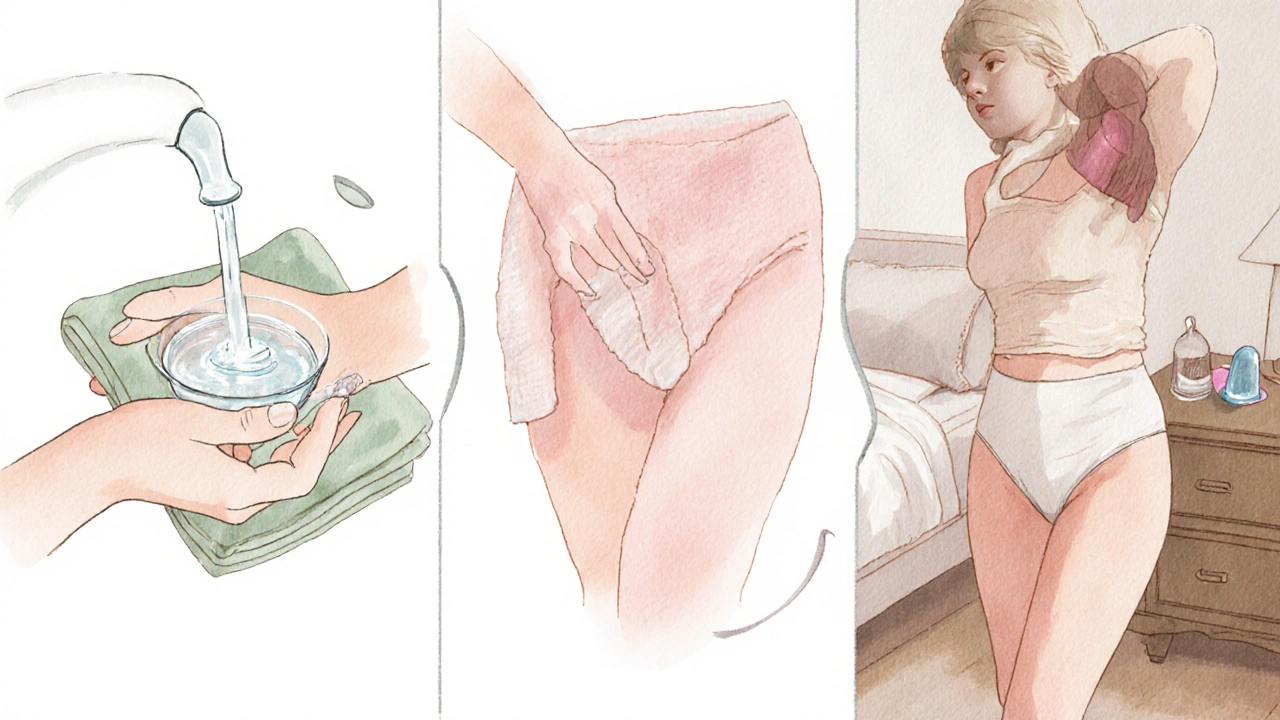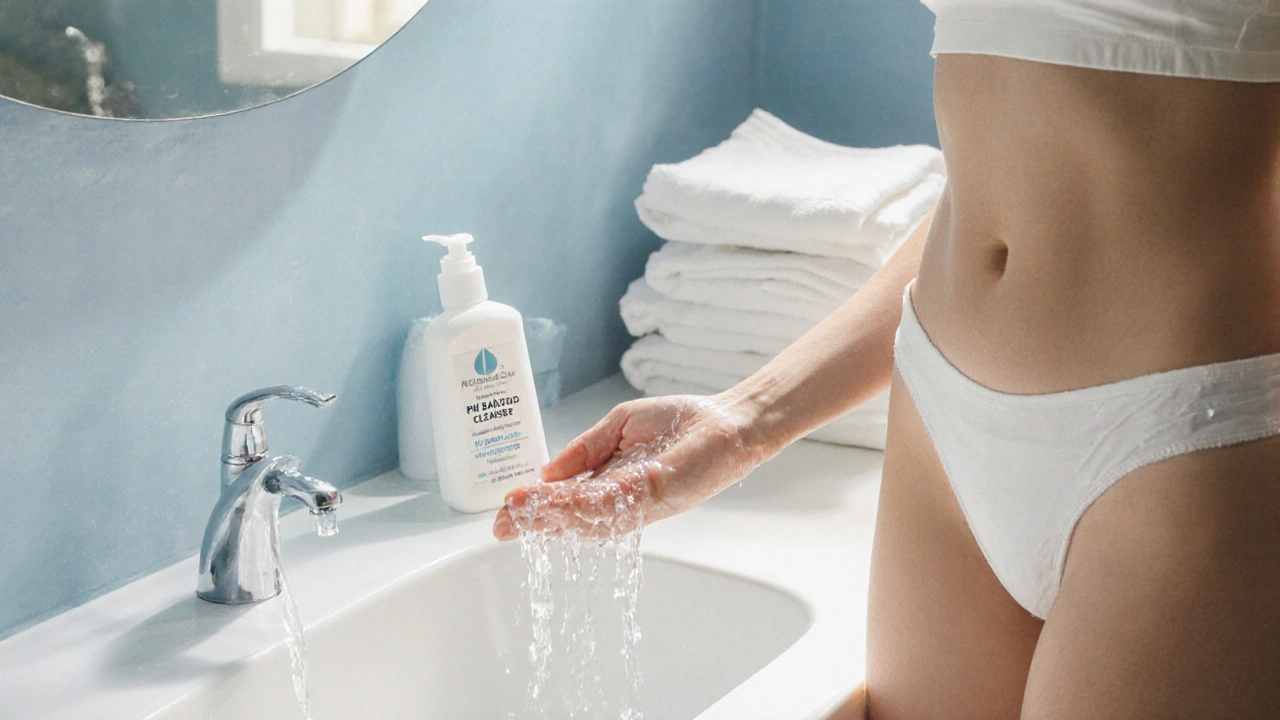Vaginal Hygiene Checker
Your Hygiene Assessment
Complete the questionnaire to get your personalized assessment.
Daily Prevention Checklist
When it comes to vaginal irritation is a common discomfort marked by itching, burning, or redness in the vaginal area, many people assume it’s just an inevitable part of womanhood. The truth is, everyday hygiene habits play a huge role in keeping the area calm and balanced.
Key Takeaways
- Maintaining a neutral pH balance is the single biggest factor in preventing irritation.
- Choose breathable cotton underwear and avoid tight synthetic fabrics.
- Skip scented soaps, wipes, and douches - they often contain irritants.
- Change menstrual products frequently and consider fragrance‑free options.
- Seek medical advice if symptoms linger longer than a few days or are accompanied by unusual discharge.
Understanding Why Hygiene Matters
The vaginal ecosystem is a delicate mix of good bacteria, moisture, and a slightly acidic environment (normally pH 3.5‑4.5). Disrupt that balance and you invite problems like bacterial vaginosis or an overgrowth of harmful microbes and yeast infection caused by Candida species. Both conditions can manifest as irritation, itching, and abnormal discharge.
Every product you slather on or wash away can either support the natural flora or strip it away. That’s why the choice of cleanser, clothing, and even how you handle a period matters.

Daily Hygiene Routine That Works
- Use plain water. For routine cleaning, lukewarm water is enough. If you prefer a cleanser, pick a mild, unscented soap with a pH close to 4‑5; avoid antibacterial or heavy‑duty formulas.
- Pat dry, don’t rub. After washing, gently pat the area dry with a soft cotton towel. Moisture trapped against the skin creates a breeding ground for irritation.
- Wear breathable fabrics. Choose 100% cotton underwear and loose‑fitting clothes. Synthetic blends trap heat and sweat, raising the local pH.
- Mind your menstrual products. Change pads, tampons, or menstrual cups at least every 4‑6 hours. Opt for fragrance‑free, organic cotton pads if possible.
- Avoid douching. Douching scrubs away beneficial bacteria and can push irritants deeper into the vagina.
- Be cautious with intimate wipes. Many contain alcohol, fragrances, or preservatives that disturb the delicate flora. If you must use a wipe, choose a fragrance‑free, hypoallergenic wipe.
Products to Avoid and Safer Alternatives
| Common Irritant | Why It Hurts | Safer Choice |
|---|---|---|
| Scented soaps & body washes | Fragrances and harsh detergents disrupt pH | Unscented, pH‑balanced gentle cleanser |
| Perfumed intimate wipes | Alcohol & preservatives cause dryness | Plain water or hypoallergenic wipes |
| Synthetic underwear (nylon, polyester) | Traps heat, reduces airflow | 100% cotton briefs or breathable blends |
| Douching solutions | Removes protective lactobacilli | None - let the vagina self‑clean |
| Strong laundry detergents on underwear | Residue irritates sensitive skin | Gentle, dye‑free detergent, extra rinse |

When Hygiene Isn’t Enough - Spotting Red Flags
Good hygiene reduces risk, but it isn’t a cure‑all. See a healthcare professional if you notice any of the following:
- Symptoms persisting longer than 72 hours despite proper care
- Heavy, foul‑smelling discharge or a change in color
- Severe burning, swelling, or pain during intercourse
- Bleeding outside of your period or after sex
- Fever or general feeling of illness
These signs could point to an infection, allergic reaction, or another medical condition that needs prescription treatment.
Quick Checklist for Daily Prevention
- Use only water or a pH‑balanced, unscented cleanser
- Pat dry, never rub
- Wear cotton underwear, change it daily
- Swap scented products for fragrance‑free versions
- Change menstrual products regularly
- Avoid douching and harsh wipes
- Watch for lingering symptoms and seek help if needed
Frequently Asked Questions
Can I use regular body soap on my genitals?
It’s better to stick with a mild, unscented soap that’s close to the vagina’s natural pH. Regular bar soap can be too alkaline and strip protective bacteria.
Are intimate wipes ever safe?
Only if they’re fragrance‑free, alcohol‑free, and labeled hypoallergenic. Even then, plain water is the safest option.
Why does cotton underwear help?
Cotton breathes, absorbs moisture, and lets the vaginal area stay cool. Synthetic fabrics trap sweat and raise pH, creating an environment where irritation thrives.
Is it okay to douche after my period?
No. Douching disrupts the natural flora regardless of timing. Let the vagina clean itself; there’s no medical benefit to douching.
When should I see a doctor for irritation?
If itching, burning, or discharge lasts more than three days, is severe, or is paired with unusual odor, bleeding, or fever, book an appointment. Early treatment prevents complications.

16 Comments
Brenda Hampton
October 6 2025
Regularly swapping to cotton underwear and changing pads every few hours can keep the pH stable. Using plain water or a mild unscented cleanser helps preserve the natural flora. Patting dry instead of rubbing cuts down friction and moisture buildup. These simple habits cut the risk of itchiness and burning. Keep an eye on any lingering symptoms and see a doctor if they persist.
Lara A.
October 7 2025
Stop trusting big pharma, they push scented wipes to ruin you!
Ashishkumar Jain
October 8 2025
Hey there! I always start my day by making sure I use just lukewarm water when I freshen up. A gentle, unscented soap is okay if you need a bit of cleanse, but never go for the antibacterial stuff. After washing I gently pat the area dry with a soft cotton towel. Staying on top of pad changes every 4‑6 hours keeps everything comfy.
Gayatri Potdar
October 9 2025
You think cotton is safe? The giants behind synthetic fabrics lace those clothes with micro‑plastics and hidden chemicals that leach into your skin, messing up the pH in ways they never admit. Even ‘fragrance‑free’ wipes can contain parabens that act like stealth irritants. If you really want protection, go raw, organic cotton and avoid anything that claims to be ‘advanced’.
Marcella Kennedy
October 10 2025
I’ve spent a lot of time reading clinical guidelines and talking to nurses about how everyday habits shape vaginal health.
First, the most critical factor is keeping the natural acidic environment intact, which means avoiding anything that raises the pH above 4.5.
Plain water is the gold standard for daily cleansing because it does not introduce foreign substances.
If you feel the need for a soap, look for a mild, unscented formulation that is specifically labeled pH‑balanced.
Heavy‑duty antibacterials or bar soaps are too alkaline and strip away the protective lactobacilli.
After washing, always pat the area dry with a clean, soft cotton towel rather than rubbing, because friction can create micro‑abrasions that become entry points for microbes.
Choosing the right underwear is another cornerstone; 100 % cotton allows air flow and absorbs moisture, while synthetic blends trap heat and moisture, creating a breeding ground for irritation.
Changing menstrual products every four to six hours limits the buildup of blood and discharge, which are perfect food for unwanted bacteria.
Fragrance‑free, organic cotton pads are a safe bet, and if you use a menstrual cup, make sure to sterilize it according to the manufacturer’s instructions.
Douching is a myth that the beauty industry pushes; it removes the good bacteria and can push irritants deeper into the vaginal canal.
Intimate wipes that claim to be ‘gentle’ often contain alcohol, preservatives, or hidden dyes that can dry out the delicate tissue.
If you must use a wipe, pick one that is completely fragrance‑free, hypoallergenic, and use it sparingly.
A gentle laundry detergent with an extra rinse cycle helps ensure no detergent residue stays on your underwear.
Pay attention to any persistent itching, burning, or unusual discharge; these are signals that the balance may be off and you should seek professional care.
In my experience, women who adopt these straightforward habits see a dramatic drop in irritation episodes and feel more comfortable day to day.
Remember, your body has a sophisticated self‑cleaning system, and the best support you can give it is to keep the environment calm, breathable, and free of harsh chemicals.
Jamie Hogan
October 11 2025
One could argue that the earlier points are overly simplistic; however a nuanced approach to microbiome preservation is essential.
Ram Dwivedi
October 12 2025
💡 A quick tip: after a shower, let the area air‑dry for a minute before patting it – it reduces residual moisture that microbes love.
pooja shukla
October 13 2025
Our culture knows better than foreign hype; the ancient practice of using plain cotton has always protected our women.
Poonam Mali
October 14 2025
From a pathophysiological perspective, the disruption of the vaginal microbiome alters the homeostatic equilibrium, precipitating an inflammatory cascade.
Alan Whittaker
October 15 2025
Don't be fooled by mainstream science; the real culprits are the hidden nanomaterials embedded in modern textiles, orchestrated by a shadow network.
Michael Waddington
October 16 2025
Honestly, that sounds like conspiracy talk, but if you look at the data sheets you’ll see trace silicone in some supposedly 'natural' fibers.
HAMZA JAAN
October 17 2025
In many societies, talking about vaginal hygiene is still taboo, so women often rely on passed‑down myths rather than evidence‑based practices.
April Rios
October 18 2025
One must recognize that epistemic authority resides in peer‑reviewed literature, not in anecdotal folklore, which frequently perpetuates misinformation.
byron thierry
October 19 2025
To encapsulate, the primary preventive measures consist of maintaining a mildly acidic environment, ensuring adequate aeration through cotton garments, and avoiding disruptive products such as scented soaps, douches, and fragranced wipes.
bob zika
October 20 2025
Indeed; the synthesis of these recommendations aligns with the consensus statements issued by leading gynecological societies, thereby providing a robust framework for patient education.
M Black
October 21 2025
Give it a try and you’ll notice the difference in a few days 😊